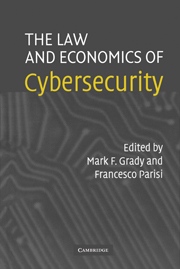Book contents
- Frontmatter
- Contents
- Acknowledgments
- Contributors
- The Law and Economics of Cybersecurity: An Introduction
- PART ONE PROBLEMS
- PART TWO SOLUTIONS
- 5 Network Responses to Network Threats: The Evolution into Private Cybersecurity Associations
- 6 The Dark Side of Private Ordering: The Network/Community Harm of Crime
- 7 Holding Internet Service Providers Accountable
- 8 Global Cyberterrorism, Jurisdiction, and International Organization
- Index
- References
7 - Holding Internet Service Providers Accountable
Published online by Cambridge University Press: 18 August 2009
- Frontmatter
- Contents
- Acknowledgments
- Contributors
- The Law and Economics of Cybersecurity: An Introduction
- PART ONE PROBLEMS
- PART TWO SOLUTIONS
- 5 Network Responses to Network Threats: The Evolution into Private Cybersecurity Associations
- 6 The Dark Side of Private Ordering: The Network/Community Harm of Crime
- 7 Holding Internet Service Providers Accountable
- 8 Global Cyberterrorism, Jurisdiction, and International Organization
- Index
- References
Summary
ABSTRACT
Internet service providers are today largely immune from liability for their role in the creation and propagation of worms, viruses, and other forms of malicious computer code. In this essay, we question that state of affairs. Our purpose is not to weigh in on the details – for example, whether liability should sound in negligence or strict liability, or whether liability is in this instance best implemented by statute or via gradual common law development. Rather, our aim is to challenge the recent trend in the courts and Congress away from liability and toward complete immunity for Internet service providers. In our view, such immunity is difficult to defend on policy grounds and sharply inconsistent with conventional tort law principles. Internet service providers control the gateway through which Internet pests enter and reenter the public network. Service providers should therefore bear some responsibility not only for stopping malicious code but also for helping to identify those individuals who originate it.
Computer viruses and related strains of Internet contagion impose a significant cost on the many individuals and entities that rely on Internet access for commerce, research, and communication. The U.S. government has responded to this problem with efforts to identify and deter those who create and propagate Internet pests. Thus, for example, both the Federal Bureau of Investigation and the Department of Homeland Security allocate substantial resources to the battle against cybercrime, and Congress has passed a number of criminal statutes designed to target the troublemakers who create Internet viruses and other forms of malicious computer code.
- Type
- Chapter
- Information
- The Law and Economics of Cybersecurity , pp. 219 - 258Publisher: Cambridge University PressPrint publication year: 2005

